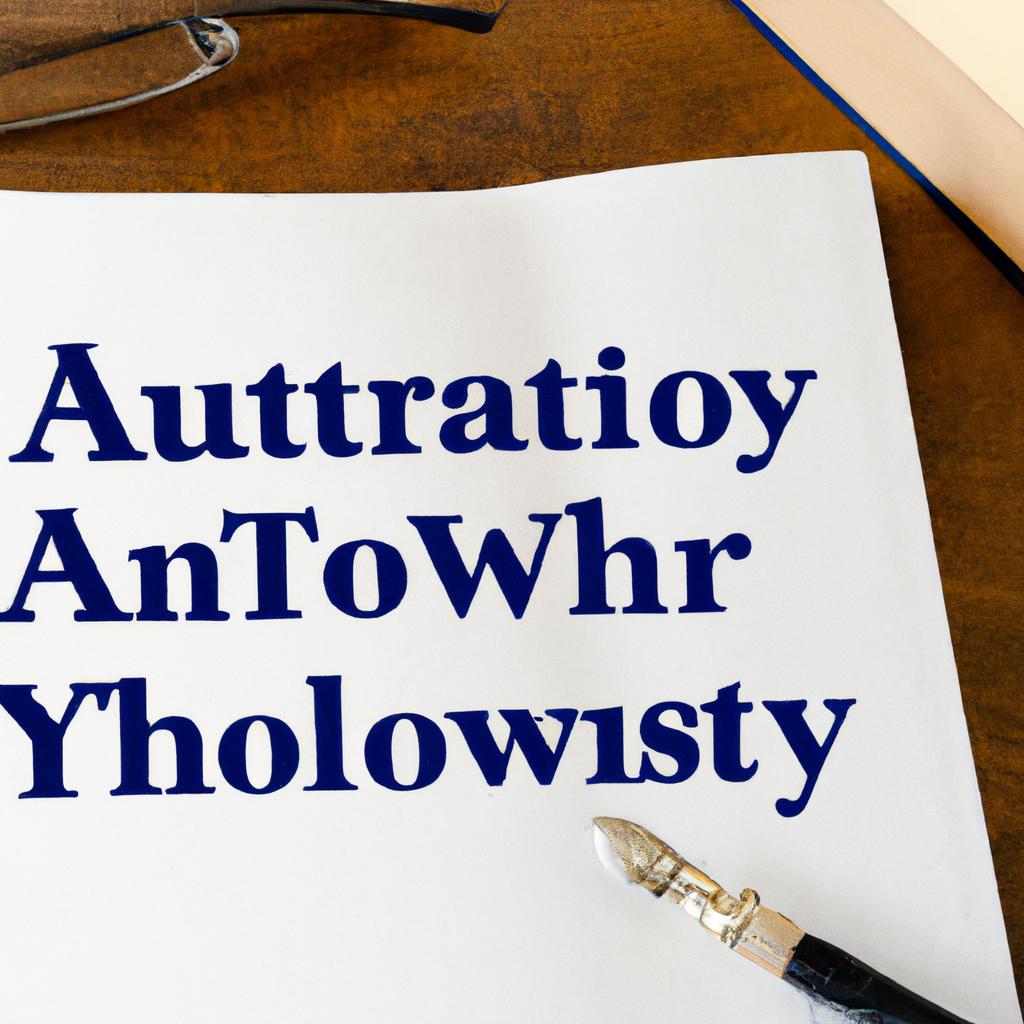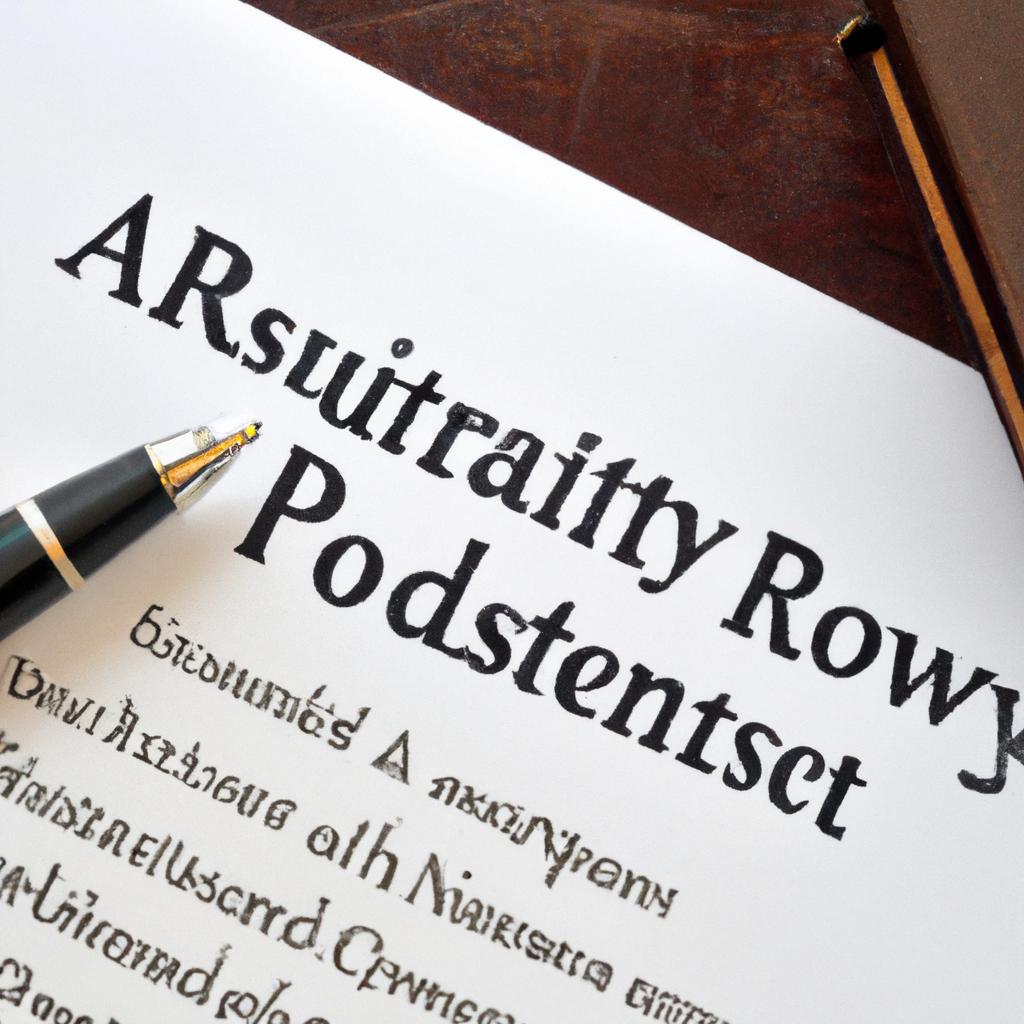In the intricate and ever-evolving world of estate planning, few tools hold as much power and significance as the power of attorney for trust. As seasoned practitioners at Morgan Legal Group in the bustling metropolis of New York City, we understand the complexities and nuances involved in crafting a comprehensive estate plan that protects your assets and ensures your wishes are carried out with precision. Join us as we delve into the intricacies of power of attorney for trust, shedding light on its importance and essential role in securing your legacy for generations to come.
Understanding the Authority of a Power of Attorney for Trust
When it comes to the authority of a power of attorney for a trust, it is essential to understand the scope and limitations of such a document. A power of attorney for trust grants an individual, known as the agent or attorney-in-fact, the authority to act on behalf of the trust grantor. This authority can include managing the trust assets, making financial decisions, and even distributing assets to beneficiaries. However, it is crucial to note that the agent’s authority is limited to the specific powers granted in the power of attorney document.
It is important for all parties involved to be fully aware of the authority granted to the agent in a power of attorney for trust. By clearly outlining the agent’s powers and responsibilities in the document, potential conflicts and misunderstandings can be avoided. Additionally, periodic reviews and updates of the power of attorney for trust can ensure that the agent continues to act in the best interests of the trust and its beneficiaries. Ultimately, is crucial for ensuring the efficient management and preservation of trust assets.

The Importance of Appointing a Trustworthy Agent
When it comes to establishing a power of attorney for trust, it is crucial to appoint a trustworthy agent. The agent is responsible for making important financial and legal decisions on behalf of the principal, so selecting someone with integrity and competence is paramount. An agent who is trustworthy will act in the best interests of the principal and ensure that their wishes and preferences are respected.
- **Honesty:** A trustworthy agent will always be honest and transparent in their dealings on behalf of the principal.
- **Reliability:** The agent should be dependable and capable of managing complex financial and legal matters.
- **Communication:** Effective communication skills are essential for keeping the principal informed and involved in important decisions.
By appointing a reliable and trustworthy agent, the principal can have peace of mind knowing that their financial and legal affairs are in good hands. At Morgan Legal Group, we understand the importance of selecting the right agent for a power of attorney for trust, and our experienced team can provide guidance and support throughout the process.

Navigating the Responsibilities of a Power of Attorney for Trust
As a power of attorney for trust, it is crucial to understand the role and responsibilities that come with this important position. Your duties involve managing financial and legal matters on behalf of the trust grantor, ensuring that the trust’s assets are handled properly and in accordance with the grantor’s wishes.
Some key responsibilities of a power of attorney for trust include:
- Managing the trust’s assets and investments
- Handling financial transactions and payments
- Preparing and filing tax returns for the trust
- Communicating with beneficiaries and other parties involved

Key Considerations When Choosing a Power of Attorney for Trust
When choosing a power of attorney for a trust, it is crucial to consider several key factors to ensure that your trust is protected and managed effectively. One important consideration is the individual’s reliability and trustworthiness. The power of attorney holder should be someone who is responsible and capable of making important financial decisions on your behalf.
- Financial acumen: The person you choose as your power of attorney should have a strong understanding of financial matters and be able to manage assets and investments wisely.
- Legal knowledge: It is beneficial to select someone with a background in law or estate planning to ensure that they can navigate the complex legal requirements and responsibilities that come with being a power of attorney for a trust.
- Conflict resolution skills: Look for someone who can handle conflicts and disagreements effectively, as they may need to mediate between beneficiaries or make tough decisions in challenging situations.
Additionally, it is essential to choose someone who understands your wishes and is committed to following them diligently. Communication skills are also crucial, as the power of attorney holder will need to effectively communicate with beneficiaries, financial institutions, and other parties involved in managing the trust. By carefully considering these key factors, you can select a power of attorney for your trust who will safeguard your interests and ensure that your wishes are carried out efficiently.
Q&A
Q: What is a power of attorney for a trust?
A: A power of attorney for a trust is a legal document that allows a designated individual (the attorney-in-fact) to make decisions and take actions on behalf of the trust grantor in the event of incapacity or inability to manage their affairs.
Q: How does a power of attorney for a trust work?
A: The power of attorney is granted by the trust grantor and specifies the extent of authority that the attorney-in-fact has over trust assets and decision-making. This allows the designated individual to step in and manage the trust in the grantor’s best interest.
Q: When is a power of attorney for a trust necessary?
A: A power of attorney for a trust is necessary when the trust grantor wants to ensure that their financial and legal affairs are managed effectively in the event of incapacity, illness, or other circumstances that prevent them from handling their affairs themselves.
Q: Who can be designated as the attorney-in-fact for a power of attorney for a trust?
A: The attorney-in-fact can be a trusted family member, friend, or professional advisor who is willing and capable of managing the trust according to the grantor’s wishes. It is important to choose someone who is reliable and competent.
Q: What are the benefits of having a power of attorney for a trust?
A: Having a power of attorney for a trust provides peace of mind for the grantor, knowing that their affairs will be managed effectively in case of emergency. It also allows for a smooth transition of authority and ensures that the trust’s assets are protected.
Q: Can a power of attorney for a trust be revoked?
A: Yes, a power of attorney for a trust can be revoked at any time by the trust grantor as long as they are mentally competent to do so. It is important to follow legal procedures and notify all relevant parties of the revocation.
Closing Remarks
In conclusion, the power of attorney for trust is a valuable tool that can provide peace of mind and security for both the grantor and the beneficiaries. By appointing a trusted individual to manage your affairs in the event of incapacity, you can ensure that your assets are protected and your wishes are carried out according to your instructions. Remember to carefully consider who you choose as your attorney-in-fact, as this decision can have a significant impact on the success of your trust. Trust in the power of attorney for trust to safeguard your legacy and provide for your loved ones in the future.

